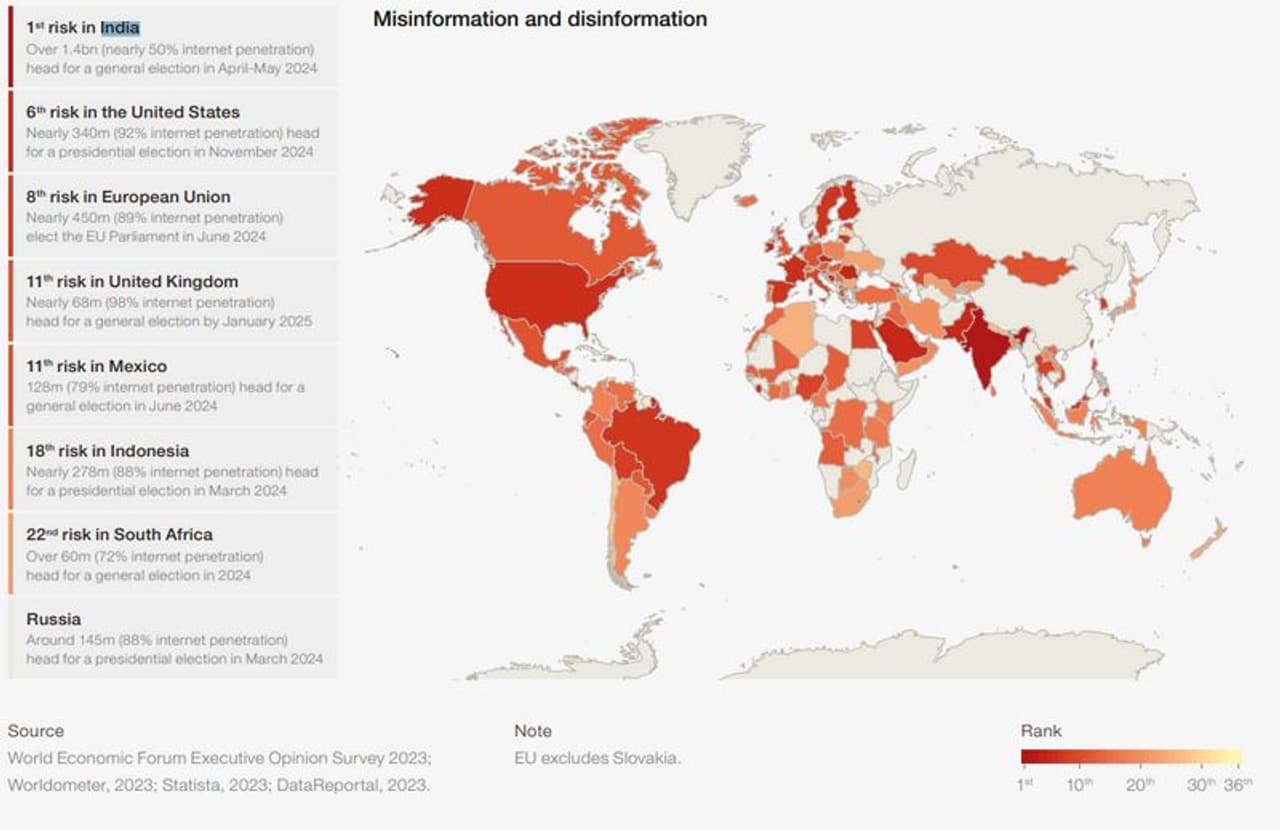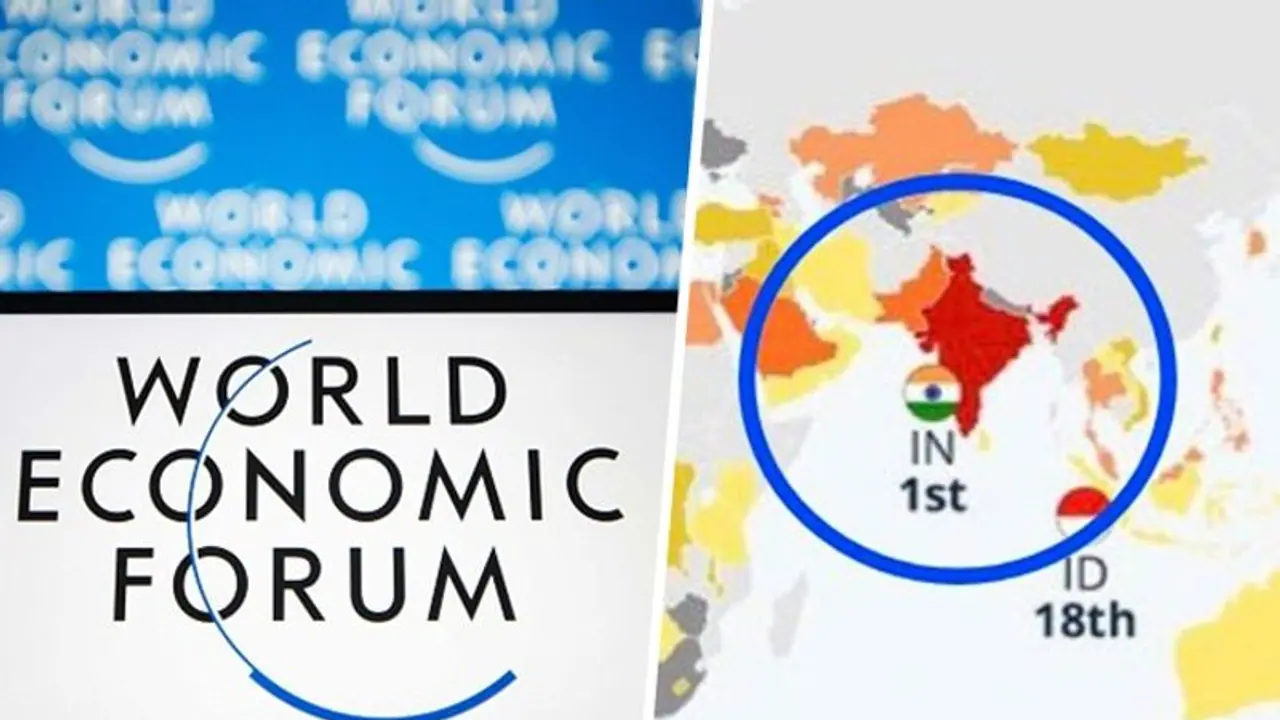The World Economic Forum's controversial 2024 Global Risks Report, ranking India as the top country in misinformation, faces widespread backlash, fueling discontent among Indian citizens, further intensified by a viral graphic featuring an incorrect map.
In a year marked by heightened election tensions globally, the World Economic Forum's (WEF) 2024 Global Risks Report has stirred controversy by ranking India as the No.1 country most susceptible to misinformation and disinformation. The report, based on the insights of 1,490 experts, has raised eyebrows in India, where citizens are expressing discontent over the portrayal of their nation as a hotspot for deceptive information.

The WEF report highlights the growing threat of misinformation and disinformation in elections across the world. These terms refer to the intentional spread of false information and the dissemination of misleading content, respectively. In the context of India, these risks have been deemed more significant than 34 other challenges such as cyber security, pollution, unemployment, terrorist attacks, infectious diseases, illicit economic activity, wealth inequality, and labour shortages among others.
What the WEF 2024 Global Risks Report states
The WEF 2024 Global Risks Report stated, "Emerging as the most severe global risk anticipated over the next two years, foreign and domestic actors alike will leverage Misinformation and disinformation to further widen societal and political divides."
"As close to three billion people are expected to head to the electoral polls across several economies – including Bangladesh, India, Indonesia, Mexico, Pakistan, the United Kingdom and the United States – over the next two years, the widespread use of misinformation and disinformation, and tools to disseminate it, may undermine the legitimacy of newly elected governments," the report highlighted.
It further added, "The presence of misinformation and disinformation in these electoral processes could seriously destabilize the real and perceived legitimacy of newly elected governments, risking political unrest, violence and terrorism, and a longer-term erosion of democratic processes."
As per the report, recent technological advancements have ushered in a new era of information manipulation, where the volume, reach, and effectiveness of falsified information have seen unprecedented growth. The expansion of disinformation campaigns across various platforms, particularly on social media, has made tracking, attributing, and controlling these flows increasingly challenging.
The report highlighted that the rise of personalized and targeted disinformation, especially towards minority communities, amplifies the difficulty in curbing the impact of these campaigns. Platforms like WhatsApp and WeChat, known for their encryption and less transparent communication channels, further contribute to the challenge, according to WEF. The evolution of artificial intelligence (AI) in generating misinformation complicates the landscape further, the report further noted. WEF believes distinguishing between AI-generated and human-generated content becomes a formidable task, not just for digitally literate individuals but also for detection mechanisms.
As India, a country with over 1.4 billion people, gears up for the Lok Sabha 2024 that is expected to be held between April and May, the WEF report noted that potential ramifications of manipulative disinformation campaigns are profound, posing significant threats to democratic processes. "If the legitimacy of elections is questioned, civil confrontation is possible – and could even expand to internal conflicts and terrorism, and state collapse in more extreme cases," it said.

Controversial WEF Ranking: Backlash from India
The WEF's ranking, placing India at the top of the list for misinformation and disinformation risk, has not been well-received by the Indian public. Many citizens are expressing skepticism about the methodology employed and the accuracy of such a label. Critics argue that singling out India without sufficient context may contribute to a negative perception of the country's information ecosystem.
"WEF does not leave any opportunity to denigrate INDIA THAT IS BHARAT and still we continue our patronage. This kind of sharing on social media is an insult to our sovereign and to the Asmita of our country, countrymen," said one irked user on X, formerly Twitter.
Another user noted, "We know what WEF does stand for. It is a mother of disinformation and misguidance. Misleading the world by a few groups of unelected wealthy."
"WEF decides what is and what is not misinformation. I am sure there is a joke in that," said a third user.
A fourth user simply said, "WEF is misinformed."
"If WEF says so, it'll be interpreted by everyone as the exact opposite. So, don't worry about it," commented a fifth X user.
Viral graphic featuring wrong map of India adds fuel to the fire
Compounding the controversy, a viral graphic titled 'Where False Information is Posing the Biggest Threat' and depicting an incorrect map of India has added fuel to the fire. The graphic by Statista circulating on social media platforms shows a distorted map of the country, sparking outrage among Indians who feel misrepresented. The misrepresentation, whether intentional or inadvertent, has only intensified the criticism directed at the WEF's assessment.
"Foreign agencies have always shown the wrong map of India," said one user on X.
A second user noted, "Even outsiders are now burning to see the growing popularity of India and stop them from visiting India. They itself spreading misinformation about India's map. India should raise concern about it internationally."
"And they talk about misinformation by posting wrong map," a third user noted, while a fourth commented, "As usual India Map is incorrectly shown."
Here's a look at how how Indians reacted to WEF's recent report ranking India as No.1 country in misinformation:
